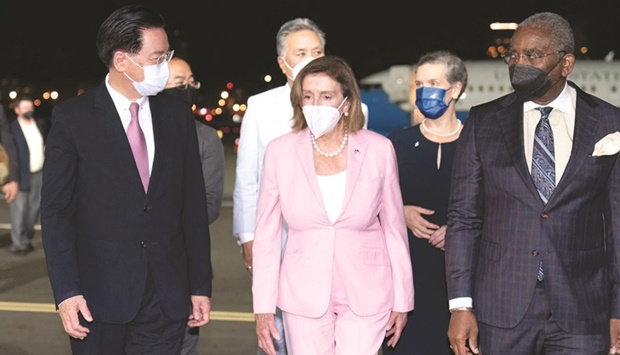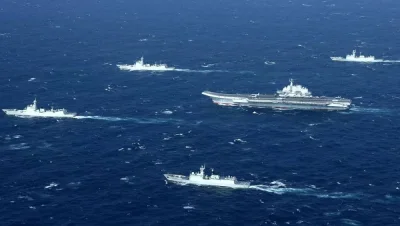US House of Representatives Speaker Nancy Pelosi arrived in Taiwan late yesterday on a trip she said demonstrates American solidarity with the island, but China condemned this first such visit in 25 years as a threat to peace and stability in the Taiwan Strait.
Pelosi and the rest of her delegation disembarked from a US Air Force transport plane at Songshan Airport in downtown Taipei after the nighttime landing on a flight from Malaysia to begin a visit that risks pushing US-Chinese relations to a new low.
They were greeted by Taiwan’s foreign minister, Joseph Wu, and Sandra Oudkirk, the top US representative in Taiwan.
“Our congressional delegation’s visit to Taiwan honours America’s unwavering commitment to supporting Taiwan’s vibrant democracy,” Pelosi said in a statement shortly after landing.”America’s solidarity with the 23mn people of Taiwan is more important today than ever, as the world faces a choice between autocracy and democracy.”
Taiwan’s President Tsai Ing-wen will meet with Pelosi, who is second in the line of succession to the US presidency and a long-time critic of Beijing, today morning and then have lunch together, the presidential office said.
Pelosi, travelling with six other American lawmakers, is the first US House speaker to visit Taiwan since 1997.
China immediately condemned Pelosi’s visit, with the foreign ministry saying it seriously damages peace and stability in the Taiwan Strait, “has a severe impact on the political foundation of China-US relations, and seriously infringes upon China’s sovereignty and territorial integrity.” The ministry said it lodged a strong protest with the US.
Chinese warplanes buzzed the line dividing the Taiwan Strait before her arrival.
The Chinese military has been put on high alert and will launch “targeted military operations” in response to Pelosi’s visit, the defence ministry said.
The People’s Liberation Army Eastern Theatre Command announced that it will conduct joint air and sea drills near Taiwan and test-launch conventional missiles in the sea east of Taiwan.
Pelosi is on a tour of Asia that includes announced visits to Singapore, Malaysia, South Korea and Japan.
Her stop in Taiwan was unannounced but widely anticipated.
In a Washington Post opinion piece released shortly after she landed, Pelosi outlined her reasons for visiting, praising Taiwan’s commitment to democratic government while criticising China as having dramatically increased tensions with Taiwan in recent years.
“We cannot stand by as the CCP proceeds to threaten Taiwan — and democracy itself,” Pelosi said, referring to the Chinese Communist Party.
Pelosi also cited China’s “brutal crackdown” against political dissent in Hong Kong, as well as its treatment of Muslim Uyghurs and other minorities, which the US has deemed genocide.
As Pelosi’s motorcade approached the hotel, escorted by police cars with flashing red and blue lights, scores of supporters cheered and ran towards the black vehicles with their arms outstretched and phone cameras on.
The motorcade drove straight into the hotel’s parking lot.
White House national security spokesperson John Kirby said after Pelosi’s arrival that the US “is not going to be intimidated” by threats or bellicose rhetoric from China.
Kirby said the visit is not a violation of either any sovereignty issues or America’s longstanding “one-China policy.”
“There’s no reason for this visit to become a spurring event for a crisis or conflict,” Kirby said.
Pelosi, 82, is a close ally of US President Joe Biden, both being members of the Democratic Party, and has been a key figure in guiding his legislative agenda through the US Congress.
Four sources said Pelosi was also scheduled to meet a group of activists who are outspoken about China’s human rights record today afternoon.
Yesterday Taiwan’s tallest building, Taipei 101, was lit up with messages including: “Welcome to Taiwan”, “Speaker Pelosi”, “Taiwan (heart) USA”.
China views visits by US officials to Taiwan as sending an encouraging signal to the pro-independence camp on the democratic, self-governed island.
Beijing considers Taiwan to be part of its territory and has never renounced using force to bring the island under its control.
Taiwan rejects China’s sovereignty claims and says only its people can decide the island’s future.
The US has no official diplomatic relations with Taiwan but is bound by American law to provide the island with the means to defend itself.
With tensions already high, several Chinese warplanes flew close to the median line dividing the Taiwan Strait yesterday morning before leaving later in the day, a source said.
Several Chinese warships have also sailed near the unofficial dividing line since Monday and remained there, the source said.
The Chinese aircraft repeatedly conducted tactical moves of briefly “touching” the median line and circling back to the other side of the strait while Taiwanese aircraft were on standby nearby, the person said.
Neither side’s aircraft normally cross the median line.
Four US warships, including the aircraft carrier USS Ronald Reagan, were positioned in waters east of Taiwan on what the US Navy called routine deployments.

Speaker of the US House of Representatives Nancy Pelosi is welcomed upon her arrival at Sungshan Airport in Taipei.


